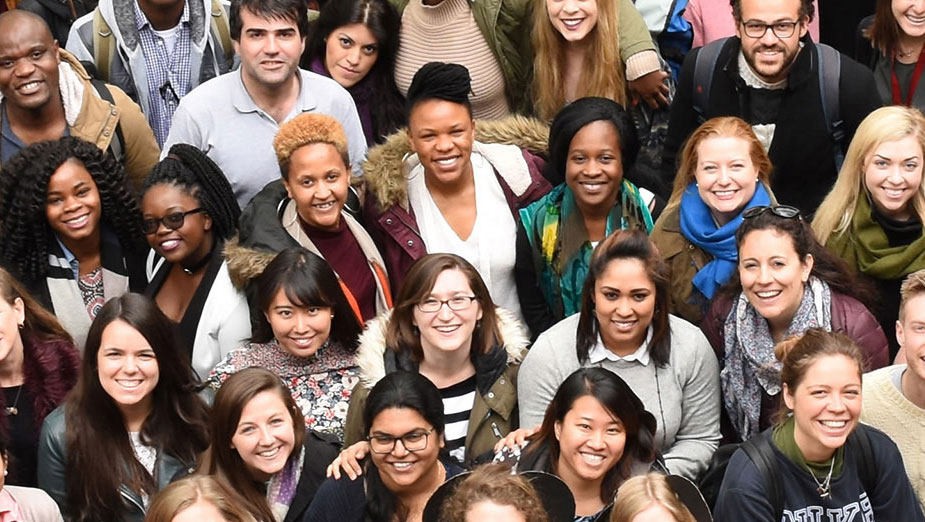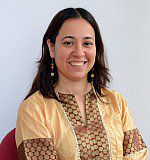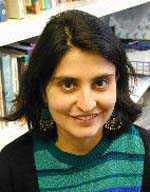Key information
- Duration:
- 1 year full time or 2 years part time
- Start date:
- September 2026
- Apply by:
- 1 August 2026 (international), 1 September 2026 (UK)

- 1st in the world for Development Studies (QS World University Rankings by Subject 2025)
Learn to tackle global challenges including inequality, sustainability and security. Gain the creativity and confidence to make a difference.
Why choose this course at Sussex?
Develop the analytical and practical skills required to address some of today’s most pressing global challenges including inequality, sustainability and security.
Based at the Institute of Development Studies (IDS), you’ll learn how to approach development problems with creativity, confidence and the ability to work collaboratively.
IDS is an independent research and teaching institute located on the campus of the University of Sussex, with a close affiliation with the University. All teaching staff are active researchers in development, resulting in a unique learning experience grounded in real-world challenges and solutions.
You’ll have a wide range of modules to choose from, giving you the flexibility to choose what interests you most and grow intellectually within the overall degree framework. You’ll develop an understanding of the main debates in development, engage in informed and critical ways with professionals from diverse backgrounds, and join an active community of people from around the world working on social justice.
IDS is a hot spot for meeting intellectual thought leaders, gaining exposure to the prevalent sectoral trends and critically discussing the global development agenda.”Mattia Barina
Development Studies MA
Masters Events
Find out the essentials of Masters study at one of our campus or online Masters events
Entry requirements
| Degree requirements | You should normally have an upper second-class (2.1) undergraduate honours degree or above. |
|---|---|
| Subject-specific requirements | Your qualification should be in the social sciences or a related subject area. You may also be considered for the course if you have other professional qualifications or experience of equivalent standing. |
Please select your country from the list.
Argentina
| Degree requirements | Licenciado/Titulo with a final mark of at least 7.5-8.5 depending on your university. |
|---|---|
| Subject-specific requirements | Your qualification should be in the social sciences or a related subject area. You may also be considered for the course if you have other professional qualifications or experience of equivalent standing. |
| Please note | Our entry requirements are guidelines and we assess all applications on a case-by-case basis. |
Australia
| Degree requirements | Bachelors degree with second-class upper division. |
|---|---|
| Subject-specific requirements | Your qualification should be in the social sciences or a related subject area. You may also be considered for the course if you have other professional qualifications or experience of equivalent standing. |
| Please note | Our entry requirements are guidelines and we assess all applications on a case-by-case basis. |
Azerbaijan
| Degree requirements | Specialist Diploma with an average mark of at least 4/5 or 80%. Magistr with a minimum average mark of at least 81%. |
|---|---|
| Subject-specific requirements | Your qualification should be in the social sciences or a related subject area. You may also be considered for the course if you have other professional qualifications or experience of equivalent standing. |
| Please note | Our entry requirements are guidelines and we assess all applications on a case-by-case basis. |
Bahrain
| Degree requirements | Bachelors degree with CGPA 3.0/4.0 (Grade B). |
|---|---|
| Subject-specific requirements | Your qualification should be in the social sciences or a related subject area. You may also be considered for the course if you have other professional qualifications or experience of equivalent standing. |
| Please note | Our entry requirements are guidelines and we assess all applications on a case-by-case basis. |
Bangladesh
| Degree requirements | A 4-year Bachelor degree with GPA of at least 3.3/4.0 |
|---|---|
| Subject-specific requirements | Your qualification should be in the social sciences or a related subject area. You may also be considered for the course if you have other professional qualifications or experience of equivalent standing. |
| Please note | Our entry requirements are guidelines and we assess all applications on a case-by-case basis. |
Brazil
| Degree requirements | Bacharel, Licenciado or professional title with a final mark of at least 7.5 or 8 depending on your university. |
|---|---|
| Subject-specific requirements | Your qualification should be in the social sciences or a related subject area. You may also be considered for the course if you have other professional qualifications or experience of equivalent standing. |
| Please note | Our entry requirements are guidelines and we assess all applications on a case-by-case basis. |
Brunei
| Degree requirements | Bachelors (Honours) degree with second class upper division or CGPA 3.1/4.0. |
|---|---|
| Subject-specific requirements | Your qualification should be in the social sciences or a related subject area. You may also be considered for the course if you have other professional qualifications or experience of equivalent standing. |
| Please note | Our entry requirements are guidelines and we assess all applications on a case-by-case basis. |
Canada
| Degree requirements | Bachelors degree with CGPA 3.3/4.0 (grade B+). |
|---|---|
| Subject-specific requirements | Your qualification should be in the social sciences or a related subject area. You may also be considered for the course if you have other professional qualifications or experience of equivalent standing. |
| Please note | Our entry requirements are guidelines and we assess all applications on a case-by-case basis. |
Chile
| Degree requirements | Licenciado with a final mark of at least 5-5.5/7 depending on your university. |
|---|---|
| Subject-specific requirements | Your qualification should be in the social sciences or a related subject area. You may also be considered for the course if you have other professional qualifications or experience of equivalent standing. |
| Please note | Our entry requirements are guidelines and we assess all applications on a case-by-case basis. |
China
| Degree requirements | Bachelors degree with a minimum overall mark of at least 70%-75% depending on your university. Sussex uses Project 211/985 to inform offer levels. As evidence of completing your degree you must provide both a Degree Certificate and Graduation Certificate. |
|---|---|
| Subject-specific requirements | Your qualification should be in the social sciences or a related subject area. You may also be considered for the course if you have other professional qualifications or experience of equivalent standing. |
| Please note | Our entry requirements are guidelines and we assess all applications on a case-by-case basis. |
Colombia
| Degree requirements | Licenciado with ‘Acreditacion de alta calidad' and a CGPA of 3.5. |
|---|---|
| Subject-specific requirements | Your qualification should be in the social sciences or a related subject area. You may also be considered for the course if you have other professional qualifications or experience of equivalent standing. |
| Please note | Our entry requirements are guidelines and we assess all applications on a case-by-case basis. |
Cyprus
| Degree requirements | Bachelors degree or Ptychion with a final mark of at least 7.5. |
|---|---|
| Subject-specific requirements | Your qualification should be in the social sciences or a related subject area. You may also be considered for the course if you have other professional qualifications or experience of equivalent standing. |
| Please note | Our entry requirements are guidelines and we assess all applications on a case-by-case basis. |
Denmark
| Degree requirements | Bachelors degree with an overall mark of at least 7 (Good Performance). |
|---|---|
| Subject-specific requirements | Your qualification should be in the social sciences or a related subject area. You may also be considered for the course if you have other professional qualifications or experience of equivalent standing. |
| Please note | Our entry requirements are guidelines and we assess all applications on a case-by-case basis. |
Ecuador
| Degree requirements | Licenciado with a final mark of at least 17/20. |
|---|---|
| Subject-specific requirements | Your qualification should be in the social sciences or a related subject area. You may also be considered for the course if you have other professional qualifications or experience of equivalent standing. |
| Please note | Our entry requirements are guidelines and we assess all applications on a case-by-case basis. |
Egypt
| Degree requirements | Bachelors degree from a university with an overall grade of at least 70-75% depending on your university. |
|---|---|
| Subject-specific requirements | Your qualification should be in the social sciences or a related subject area. You may also be considered for the course if you have other professional qualifications or experience of equivalent standing. |
| Please note | Our entry requirements are guidelines and we assess all applications on a case-by-case basis. |
France
| Degree requirements | Licence with mention bien or Maîtrise with a final mark of at least 13. |
|---|---|
| Subject-specific requirements | Your qualification should be in the social sciences or a related subject area. You may also be considered for the course if you have other professional qualifications or experience of equivalent standing. |
| Please note | Our entry requirements are guidelines and we assess all applications on a case-by-case basis. |
Germany
| Degree requirements | Bachelors degree or Magister Artium with a final mark of 2.4 or better. |
|---|---|
| Subject-specific requirements | Your qualification should be in the social sciences or a related subject area. You may also be considered for the course if you have other professional qualifications or experience of equivalent standing. |
| Please note | Our entry requirements are guidelines and we assess all applications on a case-by-case basis. |
Ghana
| Degree requirements | Bachelors degree from a public university with second-class upper division. |
|---|---|
| Subject-specific requirements | Your qualification should be in the social sciences or a related subject area. You may also be considered for the course if you have other professional qualifications or experience of equivalent standing. |
| Please note | Our entry requirements are guidelines and we assess all applications on a case-by-case basis. |
Greece
| Degree requirements | Ptychion from an AEI with a final mark of at least 7. |
|---|---|
| Subject-specific requirements | Your qualification should be in the social sciences or a related subject area. You may also be considered for the course if you have other professional qualifications or experience of equivalent standing. |
| Please note | Our entry requirements are guidelines and we assess all applications on a case-by-case basis. |
Hong Kong
| Degree requirements | Bachelors (Honours) degree with second-class upper division. |
|---|---|
| Subject-specific requirements | Your qualification should be in the social sciences or a related subject area. You may also be considered for the course if you have other professional qualifications or experience of equivalent standing. |
| Please note | Our entry requirements are guidelines and we assess all applications on a case-by-case basis. |
India
| Degree requirements | Bachelors degree with an overall mark of at least 55-70% depending on your university. |
|---|---|
| Subject-specific requirements | Your qualification should be in the social sciences or a related subject area. You may also be considered for the course if you have other professional qualifications or experience of equivalent standing. |
| Please note | Our entry requirements are guidelines and we assess all applications on a case-by-case basis. |
Indonesia
| Degree requirements | Bachelors degree from an 'A' accredited university with CGPA 3.0/4.0. |
|---|---|
| Subject-specific requirements | Your qualification should be in the social sciences or a related subject area. You may also be considered for the course if you have other professional qualifications or experience of equivalent standing. |
| Please note | Our entry requirements are guidelines and we assess all applications on a case-by-case basis. |
Iran
| Degree requirements | Bachelors degree (Licence or Karshenasi) with a final mark of at least 15. |
|---|---|
| Subject-specific requirements | Your qualification should be in the social sciences or a related subject area. You may also be considered for the course if you have other professional qualifications or experience of equivalent standing. |
| Please note | Our entry requirements are guidelines and we assess all applications on a case-by-case basis. |
Italy
| Degree requirements | Diploma di Laurea with an overall mark of at least 105. |
|---|---|
| Subject-specific requirements | Your qualification should be in the social sciences or a related subject area. You may also be considered for the course if you have other professional qualifications or experience of equivalent standing. |
| Please note | Our entry requirements are guidelines and we assess all applications on a case-by-case basis. |
Japan
| Degree requirements | Bachelors degree with a minimum C/GPA of at least 3.0/4.0 or equivalent. |
|---|---|
| Subject-specific requirements | Your qualification should be in the social sciences or a related subject area. You may also be considered for the course if you have other professional qualifications or experience of equivalent standing. |
| Please note | Our entry requirements are guidelines and we assess all applications on a case-by-case basis. |
Jordan
| Degree requirements | Bachelors degree with a CGPA of at least 3.0/4.0 or 80%. |
|---|---|
| Subject-specific requirements | Your qualification should be in the social sciences or a related subject area. You may also be considered for the course if you have other professional qualifications or experience of equivalent standing. |
| Please note | Our entry requirements are guidelines and we assess all applications on a case-by-case basis. |
Kazakhstan
| Degree requirements | Bachelors degree with a minimum overall mark of 4.0/5 or CGPA 3.33/4 |
|---|---|
| Subject-specific requirements | Your qualification should be in the social sciences or a related subject area. You may also be considered for the course if you have other professional qualifications or experience of equivalent standing. |
| Please note | Our entry requirements are guidelines and we assess all applications on a case-by-case basis. |
Kenya
| Degree requirements | Bachelors (Honours) degree with a second-class upper division. |
|---|---|
| Subject-specific requirements | Your qualification should be in the social sciences or a related subject area. You may also be considered for the course if you have other professional qualifications or experience of equivalent standing. |
| Please note | Our entry requirements are guidelines and we assess all applications on a case-by-case basis. |
Kuwait
| Degree requirements | Bachelors degree with a CGPA of at least 3.0/4.0 or B+. |
|---|---|
| Subject-specific requirements | Your qualification should be in the social sciences or a related subject area. You may also be considered for the course if you have other professional qualifications or experience of equivalent standing. |
| Please note | Our entry requirements are guidelines and we assess all applications on a case-by-case basis. |
Lebanon
| Degree requirements | Bachelors degree with a CGPA 3.5/4.0 or 14/20. |
|---|---|
| Subject-specific requirements | Your qualification should be in the social sciences or a related subject area. You may also be considered for the course if you have other professional qualifications or experience of equivalent standing. |
| Please note | Our entry requirements are guidelines and we assess all applications on a case-by-case basis. |
Malawi
| Degree requirements | Masters degree, depending on your university. |
|---|---|
| Subject-specific requirements | Your qualification should be in the social sciences or a related subject area. You may also be considered for the course if you have other professional qualifications or experience of equivalent standing. |
| Please note | Our entry requirements are guidelines and we assess all applications on a case-by-case basis. |
Malaysia
| Degree requirements | Bachelors degree with a CGPA of at least 3.0/4.0. |
|---|---|
| Subject-specific requirements | Your qualification should be in the social sciences or a related subject area. You may also be considered for the course if you have other professional qualifications or experience of equivalent standing. |
| Please note | Our entry requirements are guidelines and we assess all applications on a case-by-case basis. |
Mexico
| Degree requirements | Licenciado with a final mark of at least 8/10. |
|---|---|
| Subject-specific requirements | Your qualification should be in the social sciences or a related subject area. You may also be considered for the course if you have other professional qualifications or experience of equivalent standing. |
| Please note | Our entry requirements are guidelines and we assess all applications on a case-by-case basis. |
Nepal
| Degree requirements | A 4-year Bachelor degree with GPA of at least 3.0/4.0 or 65%. |
|---|---|
| Subject-specific requirements | Your qualification should be in the social sciences or a related subject area. You may also be considered for the course if you have other professional qualifications or experience of equivalent standing. |
| Please note | Our entry requirements are guidelines and we assess all applications on a case-by-case basis. |
Nigeria
| Degree requirements | Bachelors degree with a second-class upper division or CGPA of at least 3.0-3.49/4.0, 3.5-4.49/5.0 or 4.6-5.9/7.0 |
|---|---|
| Subject-specific requirements | Your qualification should be in the social sciences or a related subject area. You may also be considered for the course if you have other professional qualifications or experience of equivalent standing. |
| Please note | Our entry requirements are guidelines and we assess all applications on a case-by-case basis. |
Norway
| Degree requirements | Bachelors degree with an overall grade of B. |
|---|---|
| Subject-specific requirements | Your qualification should be in the social sciences or a related subject area. You may also be considered for the course if you have other professional qualifications or experience of equivalent standing. |
| Please note | Our entry requirements are guidelines and we assess all applications on a case-by-case basis. |
Oman
| Degree requirements | Bachelors degree with a CGPA of at least 3.3/4.0. |
|---|---|
| Subject-specific requirements | Your qualification should be in the social sciences or a related subject area. You may also be considered for the course if you have other professional qualifications or experience of equivalent standing. |
| Please note | Our entry requirements are guidelines and we assess all applications on a case-by-case basis. |
Pakistan
| Degree requirements | Four-year Bachelors degree with an overall mark of at least 65%-70% or CGPA 2.6 - 2.8 depending on your university. Masters degree following a 3-year Bachelors degree with an overall mark of at least 65%-70% or CGPA 2.6 - 2.8 depending on your university. |
|---|---|
| Subject-specific requirements | Your qualification should be in the social sciences or a related subject area. You may also be considered for the course if you have other professional qualifications or experience of equivalent standing. |
| Please note | Our entry requirements are guidelines and we assess all applications on a case-by-case basis. |
Palestine
| Degree requirements | Bachelors degree with at least 80% or CGPA of at least 3.0/4.0 |
|---|---|
| Subject-specific requirements | Your qualification should be in the social sciences or a related subject area. You may also be considered for the course if you have other professional qualifications or experience of equivalent standing. |
| Please note | Our entry requirements are guidelines and we assess all applications on a case-by-case basis. |
Paraguay
| Degree requirements | Bachelors with a final mark of at least 7.5/10. |
|---|---|
| Subject-specific requirements | Your qualification should be in the social sciences or a related subject area. You may also be considered for the course if you have other professional qualifications or experience of equivalent standing. |
| Please note | Our entry requirements are guidelines and we assess all applications on a case-by-case basis. |
Peru
| Degree requirements | Licenciado with a final mark of at least 13/20 from a public university or 15/20 from a private university. |
|---|---|
| Subject-specific requirements | Your qualification should be in the social sciences or a related subject area. You may also be considered for the course if you have other professional qualifications or experience of equivalent standing. |
| Please note | Our entry requirements are guidelines and we assess all applications on a case-by-case basis. |
Philippines
| Degree requirements | Bachelor degree when awarded from 2022 onwards (or a Masters degree) with a minimum of 1.5/5.0 (where 1 is the highest) or 3.7/4.0. |
|---|---|
| Subject-specific requirements | Your qualification should be in the social sciences or a related subject area. You may also be considered for the course if you have other professional qualifications or experience of equivalent standing. |
| Please note | Our entry requirements are guidelines and we assess all applications on a case-by-case basis. |
Qatar
| Degree requirements | Bachelors degree with an overall CPGA of at least 3 (on a scale of 4). |
|---|---|
| Subject-specific requirements | Your qualification should be in the social sciences or a related subject area. You may also be considered for the course if you have other professional qualifications or experience of equivalent standing. |
| Please note | Our entry requirements are guidelines and we assess all applications on a case-by-case basis. |
Russia
| Degree requirements | Bakalavr or Specialist Diploma with an average mark of at least 4. |
|---|---|
| Subject-specific requirements | Your qualification should be in the social sciences or a related subject area. You may also be considered for the course if you have other professional qualifications or experience of equivalent standing. |
| Please note | Our entry requirements are guidelines and we assess all applications on a case-by-case basis. |
Saudi Arabia
| Degree requirements | Bachelors degree with a CGPA of 3.5/5.0 or 3/4.0. |
|---|---|
| Subject-specific requirements | Your qualification should be in the social sciences or a related subject area. You may also be considered for the course if you have other professional qualifications or experience of equivalent standing. |
| Please note | Our entry requirements are guidelines and we assess all applications on a case-by-case basis. |
Singapore
| Degree requirements | Bachelors (Honours) degree with a second-class upper division or CAP 4.0. |
|---|---|
| Subject-specific requirements | Your qualification should be in the social sciences or a related subject area. You may also be considered for the course if you have other professional qualifications or experience of equivalent standing. |
| Please note | Our entry requirements are guidelines and we assess all applications on a case-by-case basis. |
South Africa
| Degree requirements | Bachelors (honours) degree with a second-class division 1. |
|---|---|
| Subject-specific requirements | Your qualification should be in the social sciences or a related subject area. You may also be considered for the course if you have other professional qualifications or experience of equivalent standing. |
| Please note | Our entry requirements are guidelines and we assess all applications on a case-by-case basis. |
South Korea
| Degree requirements | Bachelors degree with a CGPA of at least 3.3/4.5 or 3.1/4.3 or B+ |
|---|---|
| Subject-specific requirements | Your qualification should be in the social sciences or a related subject area. You may also be considered for the course if you have other professional qualifications or experience of equivalent standing. |
| Please note | Our entry requirements are guidelines and we assess all applications on a case-by-case basis. |
Spain
| Degree requirements | Licenciado with a final mark of at least 2/4 or 7/10. |
|---|---|
| Subject-specific requirements | Your qualification should be in the social sciences or a related subject area. You may also be considered for the course if you have other professional qualifications or experience of equivalent standing. |
| Please note | Our entry requirements are guidelines and we assess all applications on a case-by-case basis. |
Sri Lanka
| Degree requirements | Bachelors Special degree with an upper second honours. |
|---|---|
| Subject-specific requirements | Your qualification should be in the social sciences or a related subject area. You may also be considered for the course if you have other professional qualifications or experience of equivalent standing. |
| Please note | Our entry requirements are guidelines and we assess all applications on a case-by-case basis. |
Switzerland
| Degree requirements | Licence or Diplôme with 5/6 or 8/10. |
|---|---|
| Subject-specific requirements | Your qualification should be in the social sciences or a related subject area. You may also be considered for the course if you have other professional qualifications or experience of equivalent standing. |
| Please note | Our entry requirements are guidelines and we assess all applications on a case-by-case basis. |
Taiwan
| Degree requirements | Bachelors degree with an overall mark of at least 67%-80% depending on your university. |
|---|---|
| Subject-specific requirements | Your qualification should be in the social sciences or a related subject area. You may also be considered for the course if you have other professional qualifications or experience of equivalent standing. |
| Please note | Our entry requirements are guidelines and we assess all applications on a case-by-case basis. |
Thailand
| Degree requirements | Bachelors degree with CGPA of at least 2.8 - 3.0/4.0 or equivalent depending on your university. |
|---|---|
| Subject-specific requirements | Your qualification should be in the social sciences or a related subject area. You may also be considered for the course if you have other professional qualifications or experience of equivalent standing. |
| Please note | Our entry requirements are guidelines and we assess all applications on a case-by-case basis. |
Turkey
| Degree requirements | Lisans Diplomasi with CGPA of at least 2.8 - 3.0/4.0 or equivalent depending on your university. |
|---|---|
| Subject-specific requirements | Your qualification should be in the social sciences or a related subject area. You may also be considered for the course if you have other professional qualifications or experience of equivalent standing. |
| Please note | Our entry requirements are guidelines and we assess all applications on a case-by-case basis. |
United Arab Emirates
| Degree requirements | Bachelors degree with CGPA of at least 3.0/4.0 or equivalent. |
|---|---|
| Subject-specific requirements | Your qualification should be in the social sciences or a related subject area. You may also be considered for the course if you have other professional qualifications or experience of equivalent standing. |
| Please note | Our entry requirements are guidelines and we assess all applications on a case-by-case basis. |
USA
| Degree requirements | Bachelors degree with CGPA of at least 3.3/4.0. |
|---|---|
| Subject-specific requirements | Your qualification should be in the social sciences or a related subject area. You may also be considered for the course if you have other professional qualifications or experience of equivalent standing. |
| Please note | Our entry requirements are guidelines and we assess all applications on a case-by-case basis. |
Uzbekistan
| Degree requirements | Specialist Diploma with an average mark of at least 80%. |
|---|---|
| Subject-specific requirements | Your qualification should be in the social sciences or a related subject area. You may also be considered for the course if you have other professional qualifications or experience of equivalent standing. |
| Please note | Our entry requirements are guidelines and we assess all applications on a case-by-case basis. |
Vietnam
| Degree requirements | Bachelors degree (with a Graduate Thesis/research component) with CGPA of at least 3.0/4.0 or 7.0/10. As evidence of completing your degree you must provide both proof of graduation in addition to your transcript. |
|---|---|
| Subject-specific requirements | Your qualification should be in the social sciences or a related subject area. You may also be considered for the course if you have other professional qualifications or experience of equivalent standing. |
| Please note | Our entry requirements are guidelines and we assess all applications on a case-by-case basis. |
Zambia
| Degree requirements | Masters degree with GPA of 2.0/2.5 or equivalent. |
|---|---|
| Subject-specific requirements | Your qualification should be in the social sciences or a related subject area. You may also be considered for the course if you have other professional qualifications or experience of equivalent standing. |
| Please note | Our entry requirements are guidelines and we assess all applications on a case-by-case basis. |
Zimbabwe
| Degree requirements | Bachelors (Honours) degree with second-class upper division. |
|---|---|
| Subject-specific requirements | Your qualification should be in the social sciences or a related subject area. You may also be considered for the course if you have other professional qualifications or experience of equivalent standing. |
| Please note | Our entry requirements are guidelines and we assess all applications on a case-by-case basis. |
My country is not listed
If your country is not listed, you need to contact us and find out the qualification level you should have for this course. Contact us
| Subject-specific requirements | Your qualification should be in the social sciences or a related subject area. You may also be considered for the course if you have other professional qualifications or experience of equivalent standing. |
|---|
English language requirements
IELTS (Academic)
Advanced level (7.0 overall, including at least 6.5 in each component).
IELTS scores are valid for two years from the test date. You cannot combine scores from more than one sitting of the test. Your score must be valid when you begin your Sussex course. Find out more about IELTS
We accept IELTS One Skills Retake.
We accept IELTS Online.
Alternative English language qualifications
Proficiency tests
Cambridge Advanced Certificate in English (CAE)
185 overall, including at least 176 in each skill.
We would normally expect the CAE test to have been taken within two years before the start of your course.
You cannot combine scores from more than one sitting of the test. Find out more about Cambridge English: Advanced
Cambridge Certificate of Proficiency in English (CPE)
185 overall, including at least 176 in each skill.
We would normally expect the CPE test to have been taken within two years before the start of your course.
You cannot combine scores from more than one sitting of the test. Find out more about Cambridge English: Proficiency
Duolingo English test
130 overall, with no component score below 120.
Duolingo English test scores are valid for two years from the test date. Your score must be valid when you begin your Sussex course.
Find out more about the Duolingo English test. You will need to share your results with the University of Sussex.
LanguageCert Academic SELT
Advanced level (75 overall, including at least 70 in each component).
LanguageCert Academic SELT scores are valid for two years from the test date. Your score must be valid when you begin your Sussex course. Find out more about LanguageCert Academic SELT
We only accept LanguageCert when taken at SELT Test Centres.
We do not accept the online version. We also do not accept the non-SELT version.
LanguageCert International ESOL SELT
International ESOL SELT C1 with a minimum of 33 in each component.
LanguageCert International ESOL scores are valid for two years from the test date. Your score must be valid when you begin your Sussex course. Find out more about LanguageCert SELT
We only accept LanguageCert when taken at SELT Test Centres. We do not accept the online version.
Oxford International English Language Test (OI ELLT)
Advanced level (8 overall, including at least 8 in each component)
Oxford ELLT scores are valid for 18 months from the test date. You cannot combine scores from more than one sitting of the test. Your score must be valid when you begin your Sussex course.
Register to complete the OI ELLT and use our 10% discount code at check out: SUSX10.
We accept Oxford ELLT Global and Oxford ELLT Digital.
Pearson (PTE Academic)
Advanced level (67 overall, including at least 62 in all four skills).
PTE (Academic) scores are valid for two years from the test date. You cannot combine scores from more than one sitting of the test. Your score must be valid when you begin your Sussex course. Find out more about Pearson (PTE Academic)
We do not accept the PTE Academic Online test.
TOEFL (iBT)
For tests taken from 21 January 2026:
Advanced level (5 overall, including at least 4.5 in Listening, 4.5 in Reading, 4.5 in Speaking, 4.5 in Writing).
For tests taken before 21 January 2026:
Advanced level (95 overall, including at least 22 in Listening, 23 in Reading, 23 in Speaking, 24 in Writing).
TOEFL (iBT) scores are valid for two years from the test date. You cannot combine scores from more than one sitting of the test. Your score must be valid when you begin your Sussex course. Find out more about TOEFL (iBT)
We accept TOEFL (iBT) Home Edition.
The TOEFL Institution Code for the University of Sussex is 9166.
English language qualifications
AS/A-level (GCE)
Grade C or above in English Language.
Hong Kong Advanced Level Examination (HKALE)/ AS or A Level: grade C or above in Use of English.
GCE O-level
Grade C or above in English.
Brunei/Cambridge GCE O-level in English: grades 1-6.
Singapore/Cambridge GCE O-level in English: grades 1-6.
GCSE or IGCSE
Grade C or above in English as a First Language (Grade 4 or above in GCSE from 2017).
Grade B or above in English as a Second Language.
Ghana Senior Secondary School Certificate
If awarded before 1993: grades 1-6 in English language.
If awarded between 1993 and 2005: grades A-D in English language
Hong Kong Diploma of Secondary Education (HKDSE)
Level 5, including at least 4 in each component in English Language.
Indian School Certificate (Standard XII)
The Indian School Certificate is accepted at the grades below when awarded by the following examination boards:
Central Board of Secondary Education (CBSE) – English Core only: 80%
Council for Indian School Certificate Examinations (CISCE) - English: 80%
We will also accept the Indian Secondary School Certificate at the grade below when awarded by the following examination boards, but these State Board results must have been completed within 6 years of the start date of the course at Sussex:
Tamil Nadu; Karnataka; Delhi; Maharashtra; and West Bengal - English: 80%
International Baccalaureate Diploma (IB)
English A or English B at grade 5 or above.
Kenya Certificate of Secondary Education
Grades A - C in English language
Malaysian Certificate of Education (SPM) 1119/GCE O-level
If taken before the end of 2008: grades 1-6 in English Language.
If taken from 2009 onwards: grade C or above in English Language.
The qualification must be jointly awarded by the University of Cambridge Local Examinations Syndicate (UCLES).
West African Senior School Certificate
Grades A1-C6 (1-6) in English language when awarded by the West African Examinations Council (WAEC) or the National Examinations Council (NECO).
Country exceptions
Select to see the list of exempt English-speaking countries
If you are a national of one of the countries below, or if you have recently completed a qualification equivalent to a UK Bachelors degree or higher in one of these countries, you will normally meet our English requirement. Note that qualifications obtained by distance learning or awarded by studying outside these countries cannot be accepted for English language purposes.
You will normally be expected to have completed the qualification within two years before starting your course at Sussex. If the qualification was obtained earlier than this, we would expect you to be able to demonstrate that you have maintained a good level of English, for example by living in an English-speaking country or working in an occupation that required you to use English regularly and to a high level.
Please note that this list is determined by the UK’s Home Office, not by the University of Sussex.
List of exempt countries:
- Antigua and Barbuda
- Australia
- Bahamas
- Barbados
- Belize
- Canada**
- Dominica
- Grenada
- Guyana
- Ireland
- Jamaica
- New Zealand
- St Kitts and Nevis
- St Lucia
- St Vincent and the Grenadines
- The British Overseas Territories
- Trinidad and Tobago
- United Kingdom
- USA
** Canada: you must be a national of Canada; other nationals not on this list who have a degree from a Canadian institution will not normally be exempt from needing to provide evidence of English.
English language support
If you don’t meet the English language requirements for your degree, you may be able to take a pre-sessional course
Visas and immigration
Find out how to apply for a student visa
Admissions information for applicants
| CV detailing your experience | Yes. You must submit a CV as part of your application. |
|---|---|
| How to apply | You apply to Sussex using our application portal |
| Personal statement | Yes. You must write a detailed personal statement of approximately 800 words, explaining why you are applying for the degree and the relevance of previous development-related work experience. |
| Work experience | Yes. You should preferably have one year’s development-related work experience, which can be made up of voluntary work and vacation-based activities. |
If your qualifications aren’t listed or you have a question about entry requirements, contact us
For details on any additional costs, check out the Fees and scholarships section.
Application deadlines
1 August 2026 (international), 1 September 2026 (UK)
We strongly recommend an earlier application where possible, as some courses are in high demand and may close before the above dates. Find out more at How to apply for a Masters course
Modules
Full-time and part-time study
Choose to study this course full time or part time, to fit around your work and personal life. Modules for the full-time course are listed below. For details about the part-time course, contact us.
Core modules
Core modules are taken by all students on the course. They give you a solid grounding in your chosen subject and prepare you to explore the topics that interest you most.
Autumn teaching
Spring and summer teaching
Summer teaching
Options
Alongside your core modules, you can choose options to broaden your horizons and tailor your course to your interests. This list gives you a flavour of our options, which are kept under review and may change, for example in response to student feedback or the latest research.
While it’s our aim for students to take their preferred combinations of options, this can’t be guaranteed and will be subject to timetabling. Options may be grouped and if so, students will be able to choose a set number of options from the selection available in any particular group.
Autumn teaching
- Economic Perspectives on Development
- Gender, Identity and Inclusion
- Political Economy Perspectives on Development
- Power and Social Perspectives on Development
Spring teaching
- Aid and Poverty: the Political Economy of International Development Assistance
- Business as a Development Actor
- Climate Change and Development
- Competing in the Green Economy
- Democracy and Public Policy
- Designing Critical Enquiry
- Development in Cities
- Governance of Violent Conflict and (In)security
- Health and Development
- Multisectoral Responses to Crises and Vulnerability
- Nutrition
- Public Finance: How governments raise and spend money
- Reflective and Creative Practice for Social Change
- Social policies for reducing poverty and vulnerability
- Sustainability and Policy Processes: Issues in Agriculture, Environment and Health
- The Politics of Gender
- Theory and Practice of Impact Evaluation
- Unruly Politics
Summer teaching
Paid project opportunities with UK employers
Gain work experience by tackling a real-life challenge faced by an organisation. Learn how to develop a project, work in a team and deliver your findings to a client in a supportive setting. Explore how our Careers and Entrepreneurship team can support you
Spirit of Sussex Award
Feel involved in life at the University, make friends and enrich your experience with us – the Spirit of Sussex Award is our way of recognising your extracurricular and voluntary achievements.
- Video transcript
Hi everyone! As I'm sure you've all heard by now, the Spirit of Sussex Award is now live.
Students across the Sussex community are already earning their points
What will you do to earn yours?
There's so many ways to get involved.
Head over to the website to start your Spirit of Sussex journey.
Text: The Spirit of Sussex Award is an exciting new programme designed to recognise and celebrate the things you do outside your course.
Participating in the Award makes it easy and fun for you to get involved and make the most of university life.
We regularly review our modules to incorporate student feedback, staff expertise, as well as the latest research and teaching methodology. We’re planning to run these modules in the academic year 2026/27. However, there may be changes to these modules in response to feedback, staff availability, student demand or updates to our curriculum. We’ll make sure to let you know of any material changes to modules at the earliest opportunity.
We’ll do our best to provide as much optional choice as we can, but timetabling constraints mean it may not be possible to take some module combinations. The structure of a small number of courses means that the order of modules or the streams you choose may determine whether modules are core or optional. This means that your core modules or options may differ from what’s shown here.
Our experts
















Prof Melissa Leach











Dr Wilson Prichard



Dr James Sumberg



Mr Jean-Pierre Tranchant

Dr Dirk Willenbockel
Fees and scholarships
How much does it cost?
Fees
- Home students:
- £11,250 per year for full-time students
- Channel Islands and Isle of Man students:
- £11,250 per year for full-time students
- International students:
- £23,500 per year for full-time students
If you study part time over two years, you’ll be charged 50% of the equivalent full-time fee in each year of study. Your second-year fee – if you continue your studies without a break – will be subject to a 3% increase (subject to rounding).
If you’re a self-funded international student, you’re required to pay a tuition fee deposit. Find out more about Masters tuition fee deposits
Additional costs
Note about additional costs
Additional costs to your tuition fees may include field trips, equipment, materials, bench fees or studio hire. These costs are best estimates based on current market values which we review each year. These costs may be subject to change due to unforeseen circumstances where the University has limited control such as a change in a service provider or government guidance. We will let you know at the earliest opportunity if there is any change to these costs. We will also tell you if these costs are mandatory for passing your course or optional. Find out how to budget for student life.
Fieldwork
You have the option to undertake fieldwork for this course (though it is not mandatory). You will need to cover the additional costs that this entails. Costs will depend on the scope and scale of the activities. For example, conducting interviews in your hometown could cost very little, whereas travelling overseas to interview government officials could cost much more in terms of flights, accommodation and subsistence. There may also be options for desk-based research, such as paying for access to research databases. If you wish to conduct fieldwork, you should always talk to your course convenors and dissertation supervisors before making any arrangements.
Living costs
Find out typical living costs for studying at Sussex
How can I fund my course?
Scholarships
Our goal is to ensure that every student who wants to study with us is able to regardless of financial barriers, so that we continue to attract talented and unique people.
-
Mandela Scholarship supported by FirstRand Empowerment Foundation
Full fee waiver and maintenance award for two applicants from South Africa
-
Sussex Egypt Scholarship (Masters)
Unlimited £4,000 scholarships for Masters applicants who are nationals of Egypt
-
Sussex Nepal Scholarship (Masters)
Unlimited £4,000 scholarships for Masters applicants who are nationals of Nepal
-
Sussex Pakistan Scholarship (Masters)
Unlimited £4,000 scholarships for Masters applicants who are nationals of Pakistan
Working while you study
Our Careers and Employability Centre can help you find part-time work while you study. Find out more about career development and part-time work
Careers
of Sussex postgraduates have completed work experience by the end of their course (University of Sussex Career Readiness data at point of graduation 2023/24)
Institute of Development Studies (IDS) postgraduates have gone on to work as ministers in national governments, high-level officials in development organisations, civil servants, leaders of civil society organisations and high profile academics at universities across the world. Many of them are working to understand and tackle some of the most pressing global challenges.
They also apply their expertise to research and policy work in governments, NGOs, think tanks and universities such as:
- the Women’s Research Institute
- Educational Trust Malawi
- the British Institute of Human Rights
- Korea International Cooperation Agency
- Greenpeace
- United Nations Food and Agriculture Organization.
I was able to tailor my course to my interest in climate change and food security. IDS has played a pivotal role in getting me started as an independent research consultant.”Agnes Otzelberger
Research consultant
IDS and the Department for International Development
Design your future at Sussex
Taking the next step in your career can feel daunting, but we’ll help you to explore, connect and flourish throughout your studies and beyond.
As a Sussex student, you’ll learn how to tackle real-world challenges and have access to tailored programmes of careers support:
- one-to-one appointments with your Faculty Careers Consultant can enable you to identify your career goals, write an effective CV and prepare for future interviews
- entrepreneurship initiatives like StartUp Sussex and Ideas Lab can empower you to turn your concepts into reality.
Explore how our Careers and Entrepreneurship team can support you

Winner
Supporting Student and Graduate Employability Award
AGCAS Awards for Excellence 2024

Winner
Entrepreneurship Catalyst Award
National Enterprise Educator Awards 2024